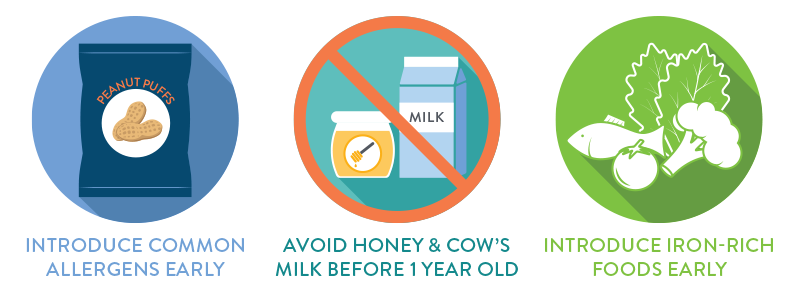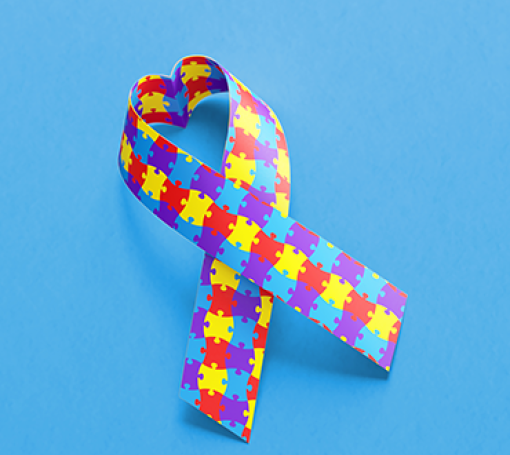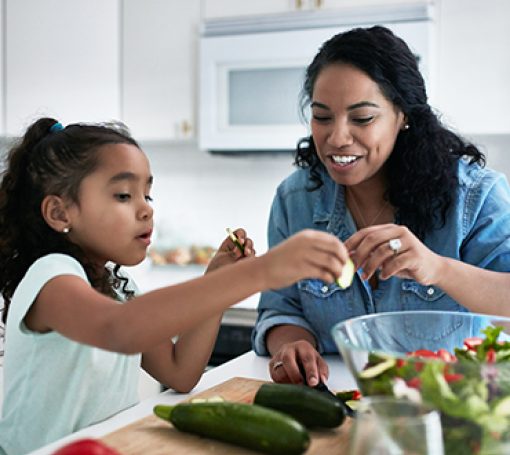
When should I introduce solids into my baby’s diet?
Most babies are ready to start solids between 4-6 months of age. Your baby may begin following food with their eyes to show interest. Signs your baby is physically ready include the ability to sit in a highchair or feeding seat with good head control and opening their mouth when food is offered to them. Tongue thrust, or pushing food out of their mouth, is a natural reflex that decreases when a baby is ready to start solids.
Are there foods I should introduce early into my child’s diet?
Common Allergens: Research now shows that introducing common allergens, including eggs, peanuts, tree nuts, wheat, dairy, soy, fish, and shellfish into a baby’s diet early can help prevent food allergies from developing. It is best to try high-risk foods when your baby is between 4-6 months old. Use baby friendly versions of these foods such as scrambled eggs and peanut butter powder.
Iron-rich Foods: It is important to introduce iron-rich foods into a baby’s diet early, as most babies need more than breastmilk alone can provide by about 9 months old. Here is a list of iron-rich foods.
Are there foods I should avoid giving my baby in the first year of life?
Honey: Babies under 1 year old should not be given honey. Rarely, it can contain botulinum spores that cause infant botulism, a toxin that paralyzes muscles.
Cow’s Milk: Babies under 1 year old should not be given cow’s milk, as they may have difficulty digesting complex dairy molecules. It is okay to give your baby cow’s milk formulas, as well as yogurt and soft cheeses when they are ready for these textures.
Potential Choking Hazards: Avoid giving your baby large or crunchy pieces of food that they can’t chew easily, as well as foods cut into round shapes. This can lead to food blocking their airway and cause choking. Some foods to avoid include hot dogs, uncut grapes, raw vegetables, popcorn, and nuts. We recommend learning CPR before your baby is born.
How long should it take my child to transition to solids?
Learning to eat solid foods is a slow, gradual transition. The steps to move your child through this transition include:
- 4-6 months: Social eating. Eat together so your child can watch you and learn how to eat.
- 6-9 months: Begin eating for nutrition. Your child will gradually wean away from breastmilk/formula and towards solids. Breastmilk/formula is still the primary source of nutrients.
- 9-12 months: Solids will take over as the primary source of nutrients. Promote eating first and drinking milk second. Your child will begin feeding themselves finger foods and desire more independence in the feeding process.
What types of food and how much should I offer my baby?
Offer your baby foods your family likes to eat. Depending on the food, you may need to mash, cut, or blend their serving. Babies can eat solids without teeth if they are soft.
Start with small amounts on a spoon to feed your baby. They may begin by just tasting the food. Once they get more comfortable with food, anticipate they will eat more. Read your baby for cues they are still hungry or are full, such as reaching for food or opening their mouth for food. If they are full, they may turn their head away.
Offer your child a spoon to use to make it an interactive experience for them. Babies enjoy trying to feed themselves. By 9 or 10 months, your baby will be able to pick up foods and feed themselves finger foods. Finger foods are small, bite-size pieces of soft foods. Some good finger foods to start with include dry cereals, soft cheese, eggs (scrambled or boiled and cut up), soft fruits, soft vegetables, crackers, and breads.
Does my child need to take vitamins?
The best source of vitamins and nutrients is food. The only vitamin your child should receive is 400 IU/day of vitamin D, due to living in the Pacific Northwest. Infant vitamin D drops are available OTC. If your family is vegan, discuss a B12 supplement with your child’s Primary Care Provider (PCP).
What changes can I expect after my baby starts solids?
Expect changes in your baby’s stool. You can offer up to 8oz of water per day into your child’s diet to help prevent constipation. It’s also important to provide a balance of foods to prevent constipation. For example, if you’re offering starchy foods like rice and bread, balance that by also offering fruits and vegetables.
Can my child have spices?
If your family enjoys spice, start with small amounts of spices around 9 months and gradually increase as your baby enjoys the flavor. Spices from other countries can contain lead. We recommend using spices only from the US to avoid lead poisoning.
What should I do if my child is picky?
Many children become picky as toddlers. It’s important to look at the quantity and variety of food they consume over a rolling 2-week period rather than a single meal or day. Your child’s appetite will fluctuate. They may also like a particular food one day and refuse it the next. Keep offering a variety of foods, even if your child refuses it.
Helpful Tips
Starting solids takes time and patience. Your baby may refuse some foods at first, spit out most of what they are offered, or prefer to play with their food. Exploration and curiosity are part of the process. Babies will increase the amount of solids they consume over time as they learn this new skill of eating. Babies will transition to a pattern of three main meals with small snacks in between 9-12 months. Your baby should be eating similar meals as you by around 1 year old, when solids will take over as their primary source of nutrition. Remember to express positive feelings around food. It should be fun, not an overwhelming experience for parents or baby.
Keep Reading
View All Posts
Autism Acceptance
April is Autism Acceptance Month. Lauren Frishholz, Nurse Practitioner at Allegro Pediatrics, offers helpful information for families of children with an autism diagnosis.

Constipation
Constipation is common in children. Learn what is considered healthy and what you should do if you believe your child may be constipated.

Children & Nutrition
Dr. Eva Taylor answers some of the most common questions about children and nutrition.

